| in Community
BU President Melissa L. Gilliam and University Provost and Chief Academic Officer Gloria Waters announced the promotion of four Arts & Sciences faculty members to the rank of full professor, eleven to the rank of associate professor, six to the rank of master lecturer, and ten to the rank of senior lecturer in 2025.
Faculty Members Promoted to Professor
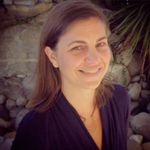 Brooke L. Blower, History, studies modern American political culture, travel, and war in urban and transnational contexts, examining assumptions about US exceptionalism. She has authored and edited numerous award-winning books and articles, including most recently, Americans in a World at War: Intimate Histories from the Crash of Pan Am’s Yankee Clipper (2023). A frequent keynote speaker and winner of the Society for Historians of American Foreign Relations’ Bernath Lecture Prize, she has received several major awards supporting her work, including a National Endowment for the Humanities Public Scholars Fellowship and the American Council of Learned Societies’ Frederick Burkhardt Fellowship.
Brooke L. Blower, History, studies modern American political culture, travel, and war in urban and transnational contexts, examining assumptions about US exceptionalism. She has authored and edited numerous award-winning books and articles, including most recently, Americans in a World at War: Intimate Histories from the Crash of Pan Am’s Yankee Clipper (2023). A frequent keynote speaker and winner of the Society for Historians of American Foreign Relations’ Bernath Lecture Prize, she has received several major awards supporting her work, including a National Endowment for the Humanities Public Scholars Fellowship and the American Council of Learned Societies’ Frederick Burkhardt Fellowship.

Marco Gaboardi, Computer Science, studies foundational methods to make computer programs more trustworthy and secure. His recent efforts have focused on developing formal techniques, using ideas from mathematical logic and probabilities to guarantee that computer programs respect data privacy. His work has been consistently published in top-tier journals and supported by several grants from the NSF and the US Census Bureau. He is a past recipient of an EU Marie Curie Fellowship, an NSF CAREER Award, a Caspar Bowden Award for Outstanding Research in Privacy Enhancing Technologies, and a Google Research Award.

Pinghua Liu, Chemistry, is a bioorganic chemist researching natural product biosynthesis and the chemical basis of the biological clock. Supported by grants from the NIH and NSF, including an NSF CAREER award, he has been recognized for contributions towards mechanistic studies of metalloenzymes and their potential in the development of novel therapeutics for chronic aging-associated diseases. He has published 67 papers in distinguished chemistry journals and obtained four patents.

Juan Ortner, Economics, is a microeconomic theorist with research interests in pure and applied theory. His research covers collusion, bargaining, and dynamic contracting, with recent work focused on developing statistical screens to detect collusive behavior in markets and designing mechanisms to mitigate its effects. He has published extensively in top economic journals, including Econometrica, the Journal of Political Economyand the Review of Economic Studies. In 2022, he was awarded the American Antitrust Institute’s Jerry S. Cohen Memorial Fund Writing Award for Best Antitrust Article on Collusion in Auctions, and in 2024 he won the Best Paper Award of the Association of Competition Economics. He is currently an editorial board member at the American Economic Review.
Faculty Members Promoted to Associate Professor
 Manos Athanassoulis, Computer Science, investigates the design and optimization of modern data systems, with an emphasis on new workloads like hybrid transactional/analytical processing, the new trade-offs that cloud computing poses for data management, and emerging hardware, such as nonvolatile memories and heterogeneous computing units. Supported by multiple National Science Foundation (NSF) grants (including an NSF CAREER award) and industry partners—such as Red Hat, Cisco, Meta, and IBM—he is a senior member of the Association for Computing Machinery (ACM) and the Institute of Electrical and Electronics Engineers (IEEE). He has published more than 70 papers in leading data management conferences and journals, including ACM Transactions on Database Systems, and authored a 2023 book on data structure design for data-intensive applications. His work has been recognized with numerous honors, including “best of” awards from ACM’s Special Interest Group on Management of Data and the International Conference on Very Large Data Bases.
Manos Athanassoulis, Computer Science, investigates the design and optimization of modern data systems, with an emphasis on new workloads like hybrid transactional/analytical processing, the new trade-offs that cloud computing poses for data management, and emerging hardware, such as nonvolatile memories and heterogeneous computing units. Supported by multiple National Science Foundation (NSF) grants (including an NSF CAREER award) and industry partners—such as Red Hat, Cisco, Meta, and IBM—he is a senior member of the Association for Computing Machinery (ACM) and the Institute of Electrical and Electronics Engineers (IEEE). He has published more than 70 papers in leading data management conferences and journals, including ACM Transactions on Database Systems, and authored a 2023 book on data structure design for data-intensive applications. His work has been recognized with numerous honors, including “best of” awards from ACM’s Special Interest Group on Management of Data and the International Conference on Very Large Data Bases.
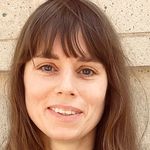 Jennifer Cazenave, Romance Studies, specializes in documentary media cultures and archival practices. She is the author of An Archive of the Catastrophe: The Unused Footage of Claude Lanzmann’s Shoah (2019), which received an honorable mention for the Society for Cinema and Media Studies’ Best First Book Award. She has given invited talks in France and the United States and published a dozen book chapters and articles and essays in mainstream outlets, including SubStance, Cinema Journal, Los Angeles Review of Books, and Balises. Her research has been supported by the American Council of Learned Societies and the United States Holocaust Memorial Museum. A forthcoming second book, Lessons in Seeing: Disability and the Media Archive, is under contract with Columbia University Press.
Jennifer Cazenave, Romance Studies, specializes in documentary media cultures and archival practices. She is the author of An Archive of the Catastrophe: The Unused Footage of Claude Lanzmann’s Shoah (2019), which received an honorable mention for the Society for Cinema and Media Studies’ Best First Book Award. She has given invited talks in France and the United States and published a dozen book chapters and articles and essays in mainstream outlets, including SubStance, Cinema Journal, Los Angeles Review of Books, and Balises. Her research has been supported by the American Council of Learned Societies and the United States Holocaust Memorial Museum. A forthcoming second book, Lessons in Seeing: Disability and the Media Archive, is under contract with Columbia University Press.
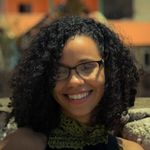 Celeste Curington, Sociology, researches the African diaspora in the United States and Europe and other communities of color. Her work bridges the fields of ethnography, critical race theory, and feminist methodology to examine how oppression and inequality around race, gender, class, and citizenship are perpetuated, experienced, and often resisted in various settings. She has published two books, Laboring in the Shadow of Empire: Race, Gender, and Care Work in Portugal (2024) and The Dating Divide: Race and Desire in the Era of Online Romance (2021). Her research has also appeared in academic journals, including the Du Bois Review, Sociology of Race and Ethnicity, and the American Sociological Review, alongside major media outlets. A trained doula, she is at work on a third ethnographic book project, Witnessing Birth, which explores the labor and community-based practices of BIPOC doulas in Massachusetts and Georgia.
Celeste Curington, Sociology, researches the African diaspora in the United States and Europe and other communities of color. Her work bridges the fields of ethnography, critical race theory, and feminist methodology to examine how oppression and inequality around race, gender, class, and citizenship are perpetuated, experienced, and often resisted in various settings. She has published two books, Laboring in the Shadow of Empire: Race, Gender, and Care Work in Portugal (2024) and The Dating Divide: Race and Desire in the Era of Online Romance (2021). Her research has also appeared in academic journals, including the Du Bois Review, Sociology of Race and Ethnicity, and the American Sociological Review, alongside major media outlets. A trained doula, she is at work on a third ethnographic book project, Witnessing Birth, which explores the labor and community-based practices of BIPOC doulas in Massachusetts and Georgia.
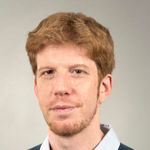
Martin Fiszbein, Economics, studies the historical roots of cultural traits and political attitudes—such as individualism, gender norms, racial animus, and civic norms—and their impact on development. He also examines structural change, technological progress, and skill formation as drivers of growth, focusing on how these processes are shaped by geo-climatic and historical factors. His research has been published in leading economics journals—including Econometrica, The Quarterly Journal of Economics, The Review of Economic Studies, and The Journal of Economic History—and he is a faculty research fellow at the National Bureau of Economic Research.
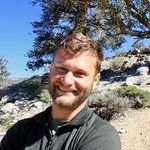 Frank Golf, Physics, is an experimental particle physicist who works to develop new particle detectors to advance understanding of the Higgs boson and to identify new particles and forces using proton beams at the CERN Large Hadron Collider. He has served on international and national committees on detectors and computing for particle and nuclear physics, and his research on dark matter theories of unification has been featured in nearly 50 top-tier scientific publications, including Nature. His work is supported by multiple grants from the US Department of Energy and the National Science Foundation. A current global collaboration including him and his students received the 2025 Breakthrough Prize.
Frank Golf, Physics, is an experimental particle physicist who works to develop new particle detectors to advance understanding of the Higgs boson and to identify new particles and forces using proton beams at the CERN Large Hadron Collider. He has served on international and national committees on detectors and computing for particle and nuclear physics, and his research on dark matter theories of unification has been featured in nearly 50 top-tier scientific publications, including Nature. His work is supported by multiple grants from the US Department of Energy and the National Science Foundation. A current global collaboration including him and his students received the 2025 Breakthrough Prize.
 Masha Kamenetska, Chemistry & Physics, is a quantum chemical physicist specializing in single-molecule experiments that explore the relationships between molecular structure and function. Her research bridges chemistry, physics, and biology and seeks to advance understanding of electrical properties of molecular circuits, the structural stability of RNA gene regulatory segments, and optical signatures of nanoparticle antennas for single-molecule detection. She is a past recipient of an NSF CAREER award, an Air Force Young Investigator Research Program award, and a Scialog Fellowship, and has published 22 articles in high-impact scientific journals, including Nature Nanotechnology and Journal of Physical Chemistry Letters. She developed and currently oversees the chemistry and physics undergraduate major at BU.
Masha Kamenetska, Chemistry & Physics, is a quantum chemical physicist specializing in single-molecule experiments that explore the relationships between molecular structure and function. Her research bridges chemistry, physics, and biology and seeks to advance understanding of electrical properties of molecular circuits, the structural stability of RNA gene regulatory segments, and optical signatures of nanoparticle antennas for single-molecule detection. She is a past recipient of an NSF CAREER award, an Air Force Young Investigator Research Program award, and a Scialog Fellowship, and has published 22 articles in high-impact scientific journals, including Nature Nanotechnology and Journal of Physical Chemistry Letters. She developed and currently oversees the chemistry and physics undergraduate major at BU.
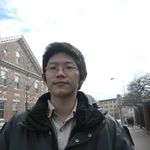 Yu-Shen Lin, Mathematics & Statistics, explores broad areas of algebraic geometry, differential geometry, and mathematical physics. Supported by numerous NSF grants, he has solved challenging problems in geometric analysis, enumerative geometry, mirror symmetry, Calabi-Yau manifolds, gravitational instantons, complex geometry, and tropical geometry. He has also developed new insights in theoretical physics for string theory and quantum gravity. A 2025–26 Simons Fellow in Mathematics, he has published 21 articles in top general mathematics and mathematical physics journals, including Theoretical and Mathematical Physics and Mathematical Research Letters.
Yu-Shen Lin, Mathematics & Statistics, explores broad areas of algebraic geometry, differential geometry, and mathematical physics. Supported by numerous NSF grants, he has solved challenging problems in geometric analysis, enumerative geometry, mirror symmetry, Calabi-Yau manifolds, gravitational instantons, complex geometry, and tropical geometry. He has also developed new insights in theoretical physics for string theory and quantum gravity. A 2025–26 Simons Fellow in Mathematics, he has published 21 articles in top general mathematics and mathematical physics journals, including Theoretical and Mathematical Physics and Mathematical Research Letters.
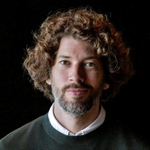 Jonathan J. B. Mijs, Sociology, is a scholar of social inequality whose research centers on how people form their beliefs about inequality and what leads them to change their views. Supported by over $2 million in external funding from national and international organizations—such as the Volkswagen Foundation, European Commission, and the Dutch Research Council—he has published 35 peer-reviewed articles in leading journals, such as Social Forces, Social Problems, and the Annual Review of Sociology. He is a past recipient of the International Society for Justice Research Morton Deutsch Award, the International Sociological Association Alan C. Kerckhoff Award, and the Royal Netherlands Academy of Arts and Sciences Early Career Award, and his work has been featured in media outlets in half a dozen countries. He has served as a subject matter expert for Amnesty International, the Organization for Economic Cooperation and Development, and the governments of Canada and the Netherlands, and was a technical consultant on the Hulu series Paradise.
Jonathan J. B. Mijs, Sociology, is a scholar of social inequality whose research centers on how people form their beliefs about inequality and what leads them to change their views. Supported by over $2 million in external funding from national and international organizations—such as the Volkswagen Foundation, European Commission, and the Dutch Research Council—he has published 35 peer-reviewed articles in leading journals, such as Social Forces, Social Problems, and the Annual Review of Sociology. He is a past recipient of the International Society for Justice Research Morton Deutsch Award, the International Sociological Association Alan C. Kerckhoff Award, and the Royal Netherlands Academy of Arts and Sciences Early Career Award, and his work has been featured in media outlets in half a dozen countries. He has served as a subject matter expert for Amnesty International, the Organization for Economic Cooperation and Development, and the governments of Canada and the Netherlands, and was a technical consultant on the Hulu series Paradise.
 Takeo Rivera, English, specializes in performance studies, Asian American studies, ethnic studies, queer theory, and video game studies in US cultural production. His first book, Model Minority Masochism: Performing the Cultural Politics of Asian American Masculinity (2022)—which explores gender and cultural depictions in Asian American theater, literature, graphic novels, historical archives, and video games—won honorable mention for the Association for Asian American Studies’ Media, Performance, and Visual Studies Book Award. He has published extensively in journals and anthologies, including Social Text, Performance Research, and Amerasia, and has been featured in mainstream outlets, such as Wired, The Atlantic, and Financial Times. He is also an award-winning playwright and a past faculty fellow at Harvard University’s Charles Warren Center.
Takeo Rivera, English, specializes in performance studies, Asian American studies, ethnic studies, queer theory, and video game studies in US cultural production. His first book, Model Minority Masochism: Performing the Cultural Politics of Asian American Masculinity (2022)—which explores gender and cultural depictions in Asian American theater, literature, graphic novels, historical archives, and video games—won honorable mention for the Association for Asian American Studies’ Media, Performance, and Visual Studies Book Award. He has published extensively in journals and anthologies, including Social Text, Performance Research, and Amerasia, and has been featured in mainstream outlets, such as Wired, The Atlantic, and Financial Times. He is also an award-winning playwright and a past faculty fellow at Harvard University’s Charles Warren Center.
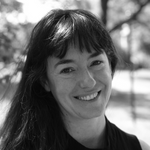 Ana Villarreal, Sociology, is an urban sociologist who draws on ethnography and social theory to advance sociological understandings of violence, emotions, and urban dynamics in Latin America. She has authored eight peer-reviewed articles and book chapters. Her first book, The Two Faces of Fear: Violence and Inequality in the Mexican Metropolis (2024), won the Outstanding Book Award from the Peace, War, and Social Conflict section of the American Sociological Association (ASA). A second book on violence and Colombian social urbanism is in development. She holds elected positions in the ASA’s urban and culture sections, serves on the editorial board of City & Community, and this past year received CAS’ Gitner Award for Distinguished Teaching.
Ana Villarreal, Sociology, is an urban sociologist who draws on ethnography and social theory to advance sociological understandings of violence, emotions, and urban dynamics in Latin America. She has authored eight peer-reviewed articles and book chapters. Her first book, The Two Faces of Fear: Violence and Inequality in the Mexican Metropolis (2024), won the Outstanding Book Award from the Peace, War, and Social Conflict section of the American Sociological Association (ASA). A second book on violence and Colombian social urbanism is in development. She holds elected positions in the ASA’s urban and culture sections, serves on the editorial board of City & Community, and this past year received CAS’ Gitner Award for Distinguished Teaching.
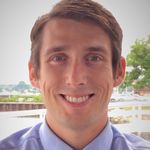 Nicholas Wagner, Psychological & Brain Sciences, is a developmental scientist whose research seeks to advance understanding of children’s socioemotional development. Supported by over $5 million in National Institutes of Health funding, his work examines how biological and environmental factors influence psychosocial adaptation and risk for psychopathology. He has authored more than 60 peer-reviewed articles in leading journals and earned early career awards from the Society for Research in Child Development, the International Society for Research on Aggression, and the Association for Psychological Science. He serves on the editorial boards of Child Development, Developmental Psychology, and Development and Psychopathology.
Nicholas Wagner, Psychological & Brain Sciences, is a developmental scientist whose research seeks to advance understanding of children’s socioemotional development. Supported by over $5 million in National Institutes of Health funding, his work examines how biological and environmental factors influence psychosocial adaptation and risk for psychopathology. He has authored more than 60 peer-reviewed articles in leading journals and earned early career awards from the Society for Research in Child Development, the International Society for Research on Aggression, and the Association for Psychological Science. He serves on the editorial boards of Child Development, Developmental Psychology, and Development and Psychopathology.
Faculty Members Promoted to Master Lecturers
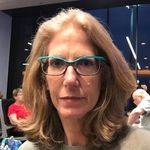 Angelica Avcikurt, Romance Studies, teaches a range of courses in the Department of Romance Studies covering everything from introductory, intermediate, and advanced language to translation theory and anti-racist pedagogy. She is especially interested in sociolinguistics, theology, translation, and the cultures of the Caribbean. A linguist by training, she has completed extensive work in pragmatics and linguistic variation. Her doctoral research examines language change and death in the Judeo-Spanish speaking community in Istanbul, Turkey. She also dedicates her time to Terrier F1RSTS, which focuses on providing support and mentorship to first-generation students.
Angelica Avcikurt, Romance Studies, teaches a range of courses in the Department of Romance Studies covering everything from introductory, intermediate, and advanced language to translation theory and anti-racist pedagogy. She is especially interested in sociolinguistics, theology, translation, and the cultures of the Caribbean. A linguist by training, she has completed extensive work in pragmatics and linguistic variation. Her doctoral research examines language change and death in the Judeo-Spanish speaking community in Istanbul, Turkey. She also dedicates her time to Terrier F1RSTS, which focuses on providing support and mentorship to first-generation students.
 Gavin Benke, Writing Program, teaches first-year writing seminars including “Narratives of Finance” and “The 2008 Financial Crisis,” an elective in public writing, and courses in KHC and XCC. He is a member of the Faculty Council and a union steward. A scholar of business history, Dr. Benke is the author of Risk and Ruin: Enron and the Culture of American Capitalism and many other publications and presentations on business history. He also contributes to the Washington Post’s Made By History column.
Gavin Benke, Writing Program, teaches first-year writing seminars including “Narratives of Finance” and “The 2008 Financial Crisis,” an elective in public writing, and courses in KHC and XCC. He is a member of the Faculty Council and a union steward. A scholar of business history, Dr. Benke is the author of Risk and Ruin: Enron and the Culture of American Capitalism and many other publications and presentations on business history. He also contributes to the Washington Post’s Made By History column.
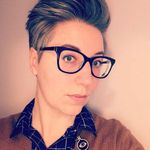 Jessica Kent, Writing Program, is Associate Director of the Writing Program. They teach classes on the graphic memoir and lead a range of initiatives advocating for inclusion and accessibility in the classroom and the workplace. Dr. Kent has also collaborated closely with Neuroscience, Economics, and Math/Stats to help those units develop discipline-specific writing pedagogies. They publish and present on writing in the disciplines, accessible pedagogy, and equitable grading practices.
Jessica Kent, Writing Program, is Associate Director of the Writing Program. They teach classes on the graphic memoir and lead a range of initiatives advocating for inclusion and accessibility in the classroom and the workplace. Dr. Kent has also collaborated closely with Neuroscience, Economics, and Math/Stats to help those units develop discipline-specific writing pedagogies. They publish and present on writing in the disciplines, accessible pedagogy, and equitable grading practices.

Rebecca Loy, Chemistry, teaches introductory organic chemistry lectures and laboratory courses such as Organic Chemistry 1 and 2 (CH 203/204) and Intensive Organic Chemistry (CH 211). She has developed new lab curricula to encourage effective engagement of her students and has helped unify and restructure the lectures CH 203/204/214 series for a more equitable learning experience. Her chemical education research focuses on the use of organic chemistry prelecture videos in Organic Chemistry 1 and 2 for better lecture engagement and the development of safety videos and activities for the undergraduate teaching labs.
 Marie McDonough, Writing Program, teaches first-year writing classes on interdisciplinary topics including “Indigenous Resistance” and “The French Revolution,” as well as courses in the English Department, the Core Curriculum, where she serves as Writing Coordinator, and the Women, Gender & Sexuality Program, where she has served as Director of Graduate Studies. She has published in disability studies and brings this expertise to the writing classroom. She is also a frequent translator of Michel Foucault, with a new translation of his Birth of the Clinic forthcoming in 2026.
Marie McDonough, Writing Program, teaches first-year writing classes on interdisciplinary topics including “Indigenous Resistance” and “The French Revolution,” as well as courses in the English Department, the Core Curriculum, where she serves as Writing Coordinator, and the Women, Gender & Sexuality Program, where she has served as Director of Graduate Studies. She has published in disability studies and brings this expertise to the writing classroom. She is also a frequent translator of Michel Foucault, with a new translation of his Birth of the Clinic forthcoming in 2026.
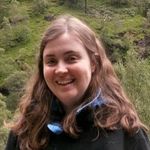
Holly Schaaf, Writing Program, offers writing seminars on environmental and ecological themes that include experiential learning, such as “Boston Wildlife Now” and “Biodiverse Sustainability Now.” In addition to her expertise in Irish literature, she has published and presented frequently on experiential learning in the writing classroom. Dr. Schaaf serves as co-director of Boston Now, the Writing Program’s experiential learning initiative.
Faculty Members Promoted to Senior Lecturers

Jacob Burg, Writing Program, is Associate Director for the Writing Center. He teaches first-year writing seminars on genre fiction and courses preparing undergraduate writing consultants to tutor their peers. Dr. Burg has contributed to the Writing Program’s curricular approach to portfolios and created teaching resources on critical language awareness. He publishes and presents on writing pedagogy and mentoring.
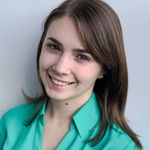 Alexis Courtney, Chemistry, teaches CH 203 Organic Chemistry I and CH 174 Principles of Organic Chemistry. She also teaches the organic chemistry Integrated Science Experience (ISE), providing a specialized lab curriculum that integrates theory and techniques from multiple disciplines, simulating modern medicinal chemistry research. Outside the classroom, she has developed an updated lab curriculum for the yearlong organic chemistry sequence. She also conducts chemistry education research, focusing on gamification of organic chemistry topics and exploring alternative exam assessment methods. Additionally, she regularly presents her work at chemistry education conferences. She has been promoted to senior lecturer.
Alexis Courtney, Chemistry, teaches CH 203 Organic Chemistry I and CH 174 Principles of Organic Chemistry. She also teaches the organic chemistry Integrated Science Experience (ISE), providing a specialized lab curriculum that integrates theory and techniques from multiple disciplines, simulating modern medicinal chemistry research. Outside the classroom, she has developed an updated lab curriculum for the yearlong organic chemistry sequence. She also conducts chemistry education research, focusing on gamification of organic chemistry topics and exploring alternative exam assessment methods. Additionally, she regularly presents her work at chemistry education conferences. She has been promoted to senior lecturer.
 Thomas Enkosky, Economics, Over the past decade, Dr. Thomas Enkosky has taught courses spanning an astonishing array of topics, including applied algebra, applied statistics, calculus, differential equations, linear algebra, discrete mathematics, graph theory, introductory statistics, mathematics of personal finance, multivariable calculus, optimization methods, probability, and real analysis. He developed the new course MA 433 Graph Theory, as well as fully online courses in Elementary Statistics and Calculus I. His research interests are in graph theory, combinatorics, and discrete mathematics. He serves as the departmental Summer Term Coordinator, and regularly as a Teaching Fellow Coordinator.
Thomas Enkosky, Economics, Over the past decade, Dr. Thomas Enkosky has taught courses spanning an astonishing array of topics, including applied algebra, applied statistics, calculus, differential equations, linear algebra, discrete mathematics, graph theory, introductory statistics, mathematics of personal finance, multivariable calculus, optimization methods, probability, and real analysis. He developed the new course MA 433 Graph Theory, as well as fully online courses in Elementary Statistics and Calculus I. His research interests are in graph theory, combinatorics, and discrete mathematics. He serves as the departmental Summer Term Coordinator, and regularly as a Teaching Fellow Coordinator.
 Perta Hundemer-Friedman, World Languages & Literatures, teaches German language at all levels, along with advanced, content-based courses Science and Culture and Music, Art, and History in the German-speaking World. She coordinates the German program with energy, diligence, and a flair for organizing co-curricular events, including a fascinating series on German climate activism supported by a grant from the German government. In addition to curriculum revision and extensive outreach and advising, she was instrumental in setting up the new study abroad program in Berlin. She gives talks on campus and at regional and national conferences and co-organized the Boston Area Pedagogy Conference.
Perta Hundemer-Friedman, World Languages & Literatures, teaches German language at all levels, along with advanced, content-based courses Science and Culture and Music, Art, and History in the German-speaking World. She coordinates the German program with energy, diligence, and a flair for organizing co-curricular events, including a fascinating series on German climate activism supported by a grant from the German government. In addition to curriculum revision and extensive outreach and advising, she was instrumental in setting up the new study abroad program in Berlin. She gives talks on campus and at regional and national conferences and co-organized the Boston Area Pedagogy Conference.
 Myeongok Lee, World Languages & Literatures, teaches Japanese language at all levels, as well as Japanese for the Professions and Japanese Media. She develops supplemental materials to enhance proficiency and assigns a “challenge project” so students can research topics of personal interest. As coordinator of first-year Japanese, one of the largest multi-section courses, she excels at training part-time instructors. She organized a seminar with the Boston Career Forum to introduce BU students to career opportunities in Japanese companies. She presents research at conferences, including a paper, now published, on the perception and production of L2 Sounds, at the Princeton Japanese Pedagogy Forum.
Myeongok Lee, World Languages & Literatures, teaches Japanese language at all levels, as well as Japanese for the Professions and Japanese Media. She develops supplemental materials to enhance proficiency and assigns a “challenge project” so students can research topics of personal interest. As coordinator of first-year Japanese, one of the largest multi-section courses, she excels at training part-time instructors. She organized a seminar with the Boston Career Forum to introduce BU students to career opportunities in Japanese companies. She presents research at conferences, including a paper, now published, on the perception and production of L2 Sounds, at the Princeton Japanese Pedagogy Forum.
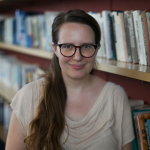 Rachel Meade, Political Science, joined Boston University as Lecturer in 2020. She teaches Introduction to Public Policy, Media and Politics in the United States, Public Opinion in American Politics, U.S. Social Movements, Comparative Populism, and Identity Politics. She is preparing a book manuscript on populism in Latin America and the United States, and she regularly engages in public-facing scholarship and commentary on this topic. Dr. Meade is a popular advisor for Honors and BA/MA theses. She has helped develop recommendations for revising the department’s Honors Program and implementing pedagogical training for the PhD program.
Rachel Meade, Political Science, joined Boston University as Lecturer in 2020. She teaches Introduction to Public Policy, Media and Politics in the United States, Public Opinion in American Politics, U.S. Social Movements, Comparative Populism, and Identity Politics. She is preparing a book manuscript on populism in Latin America and the United States, and she regularly engages in public-facing scholarship and commentary on this topic. Dr. Meade is a popular advisor for Honors and BA/MA theses. She has helped develop recommendations for revising the department’s Honors Program and implementing pedagogical training for the PhD program.
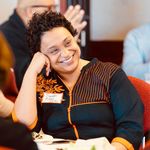 Swati Mehta Rani, Writing Program, brings expertise in language and literacy to first-seminars on race, language, and Asian identity. As part of her pedagogical and scholarly interest in social justice, Dr. Rani is especially dedicated to mentoring minoritized students. She has chaired the program’s DEIJ committee, served on CAS’s Diversity and Inclusion Action Team, and publishes and presents on inclusive and anti-racist pedagogy. She is a Susan Jackson Award recipient.
Swati Mehta Rani, Writing Program, brings expertise in language and literacy to first-seminars on race, language, and Asian identity. As part of her pedagogical and scholarly interest in social justice, Dr. Rani is especially dedicated to mentoring minoritized students. She has chaired the program’s DEIJ committee, served on CAS’s Diversity and Inclusion Action Team, and publishes and presents on inclusive and anti-racist pedagogy. She is a Susan Jackson Award recipient.
 Richard Reibstein, Earth & Environment, is an integral part of the law and policy side of teaching for the Department of Earth & Environment, teaching courses such as Law for Sustainability and Research for Environmental Agencies and Organizations. As a government official and citizen volunteer, Reibstein has been a leader in pollution prevention and policy innovation. As an educator at BU, his immersive projects have directly involved students in environmental and public health work, interacting with and developing solutions for real-world issues. Reibstein’s support through teaching and mentoring has helped many students embark on environmental and public health careers.
Richard Reibstein, Earth & Environment, is an integral part of the law and policy side of teaching for the Department of Earth & Environment, teaching courses such as Law for Sustainability and Research for Environmental Agencies and Organizations. As a government official and citizen volunteer, Reibstein has been a leader in pollution prevention and policy innovation. As an educator at BU, his immersive projects have directly involved students in environmental and public health work, interacting with and developing solutions for real-world issues. Reibstein’s support through teaching and mentoring has helped many students embark on environmental and public health careers.
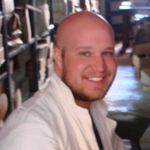 Joshua Robinson, Archaeology, is an archaeologist with research interests in the paleoecological context of Plio-Pleistocene biological and behavioral adaptations of the human lineage. His primary research is focused on investigating the diets of our ancestors and the environmental context of the Middle to the Later Stone Age transition in sub-Saharan Africa. He has received funding for his research from the Leakey Foundation and the American Philosophical Society. As a Lecturer in the Archaeology Program, Josh teaches the large introductory course – AR100: Great Discoveries in Archaeology – and upper-level courses on environmental archaeology and archaeological science methods.
Joshua Robinson, Archaeology, is an archaeologist with research interests in the paleoecological context of Plio-Pleistocene biological and behavioral adaptations of the human lineage. His primary research is focused on investigating the diets of our ancestors and the environmental context of the Middle to the Later Stone Age transition in sub-Saharan Africa. He has received funding for his research from the Leakey Foundation and the American Philosophical Society. As a Lecturer in the Archaeology Program, Josh teaches the large introductory course – AR100: Great Discoveries in Archaeology – and upper-level courses on environmental archaeology and archaeological science methods.
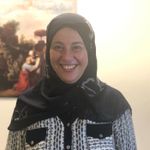 Salima Slimane, World Languages & Literatures, teaches Arabic language at all levels, Arab Media, Arab Culture Through Film, as well as French language in Romance Studies. She specializes in developing instructional strategies to meet the needs of diverse learners; she also incorporates social justice into her courses and finds creative ways to connect students with Arabic culture and native speakers. Her exemplary dedication to supporting students earned her a CAS Award for Distinction in First-Year Undergraduate Education. As Coordinator of the Arabic Program she does extensive outreach and extra-curricular planning. She advocates for education in the greater Boston area, gives talks at local libraries and film festivals, and presents at regional and national conferences
Salima Slimane, World Languages & Literatures, teaches Arabic language at all levels, Arab Media, Arab Culture Through Film, as well as French language in Romance Studies. She specializes in developing instructional strategies to meet the needs of diverse learners; she also incorporates social justice into her courses and finds creative ways to connect students with Arabic culture and native speakers. Her exemplary dedication to supporting students earned her a CAS Award for Distinction in First-Year Undergraduate Education. As Coordinator of the Arabic Program she does extensive outreach and extra-curricular planning. She advocates for education in the greater Boston area, gives talks at local libraries and film festivals, and presents at regional and national conferences